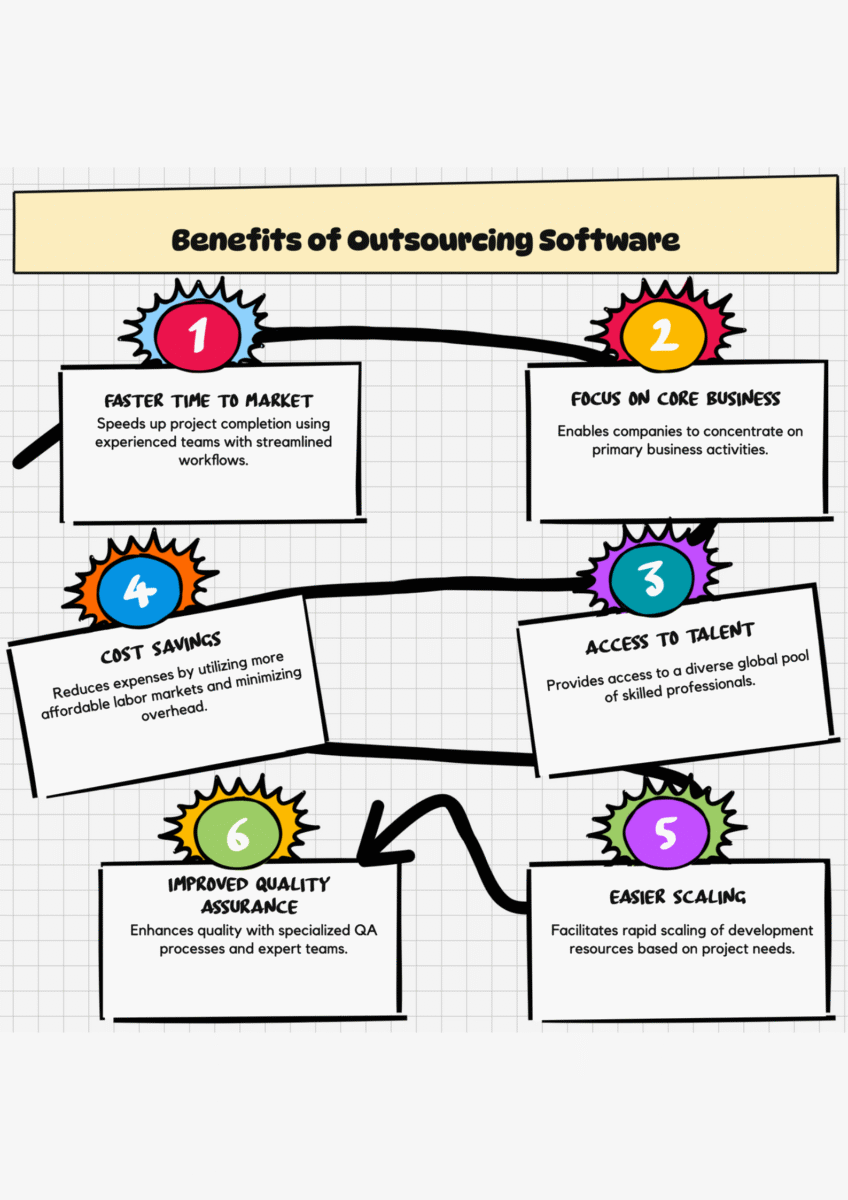
24 Reasons Why Top Companies Outsource Software Development
The notion that outsourcing software development risks quality and control is widespread and deeply ingrained. What this perspective misses is the increasingly high standards and expertise of outsourced teams. In-house software development is the best approach, or so many believe.
Thank you for reading this post, don't forget to subscribe!I’m here to tell you a secret: outsourced software development that frees up internal resources and accelerates growth. The towering obstacle? It’s cost, time, and effort-intensive, often draining resources from core business objectives.
After coordinating numerous successful outsource projects, I’ve refined a seamless process that maintains control while tapping into global talent.
Are you struggling to keep up with the rapid pace of technological changes? Do you find your in-house development team stretched thin, unable to meet project deadlines or deliver the quality you need? You’re not alone. Many companies face these challenges in today’s competitive business space.
But what if there was a way to access top-tier talent, reduce costs, and accelerate your software development projects all at once? That’s where outsourcing comes in. Top companies across the globe are turning to software development outsourcing as a strategic solution to their tech woes.
Here’s a table summary of the 24 reasons for outsourcing software development and one benefit from the article:
| Reason | Explanation |
|---|---|
| 1. Faster Time to Market | Outsourcing accelerates project completion by leveraging experienced teams with established workflows. |
| 2. Focus on Core Business | Allows companies to concentrate on their primary business activities by outsourcing software development tasks. |
| 3. Focus on Core Competencies | Enables in-house teams to specialize in their strengths, leaving software development to experts. |
| 4. Access to Talent | Provides access to a global pool of skilled professionals, often not available locally. |
| 5. Cost Savings | Reduces costs by utilizing cheaper labor markets and saving on infrastructure and training. |
| 6. Decreased Risks | Outsourcing partners often have robust risk management processes, reducing project risks. |
| 7. Easier Scaling | Offers the ability to quickly scale development resources up or down as needed. |
| 8. Expands Your Talent Pool | Access to a larger and more diverse pool of experts from around the world. |
| 9. Labor Costs | Lowers labor expenses by tapping into regions with lower costs while maintaining quality. |
| 10. Cost Optimization | Converts fixed costs into variable ones, allowing for better budget management. |
| 11. Scalability | Provides flexibility in adjusting team size according to project demands. |
| 12. Handling Unique Skills | Access to specialized skills or niche expertise that may not be available in-house. |
| 13. Main Software Development Models | Offers various outsourcing models like project-based, dedicated team, and staff augmentation. |
| 14. Flexibility and Speed | Allows rapid assembly of teams with the right skills to quickly adapt to changes. |
| 15. Quality Assurance | Outsourcing can enhance quality by utilizing specialized QA processes and teams. |
| 16. Risk Management | Helps mitigate risks, especially in areas like cybersecurity and compliance. |
| 17. Technology | Provides access to the latest technologies and expertise without the need for continuous investment. |
| 18. Flexibility | Offers adaptability in team composition, project scope, and resource allocation. |
| 19. Identify Your Requirements | Forces clear articulation of project requirements, leading to better project outcomes. |
| 20. Increased Competition | Encourages competition among outsourcing partners, driving innovation and value. |
| 21. Issues with Communication | Improves overall communication practices through experience working with remote teams. |
| 22. Leverage Technology Advancements | Outsourcing partners often have the latest technology knowledge, helping you stay competitive. |
| 23. Reduce Software Development Cost | Significantly cuts costs, including savings on infrastructure, training, and opportunity costs. |
| 24. Reduces Time | Shortens project timelines by leveraging global teams and round-the-clock development. |
TL;DR:
- Outsourcing software development offers numerous benefits for companies
- Key advantages include cost savings, access to talent, and faster project completion
- It allows businesses to focus on core competencies while leveraging external expertise
- Outsourcing provides flexibility, scalability, and risk mitigation
- Top companies use various outsourcing models to meet their specific needs
24 reasons why top companies are choosing to outsource their software development:

1. Faster Time to Market
Being first to market can make or break a product’s success. Outsourcing software development can significantly accelerate your time to market, giving you a competitive edge.
Why does outsourcing speed things up? When you partner with an experienced outsourcing team, you’re tapping into a well-oiled machine. These professionals have streamlined processes, established workflows, and the ability to work around the clock thanks to different time zones.
Example: “A fintech startup was struggling to launch its mobile banking app before competitors flooded the market. By outsourcing development to a specialized team, they were able to leverage the team’s expertise in financial software and mobile app development. The result? They launched their app three months ahead of schedule, capturing a significant market share before their competitors could catch up.”
2. Focus on Core Business
One of the most significant advantages of outsourcing software development is that it allows your company to concentrate on what it does best – its core business.
When you’re not bogged down by the intricacies of software development, you can channel your energy and resources into areas that directly contribute to your company’s growth and success.
Example: “A retail chain decided to create a custom inventory management system. Instead of diverting their in-house IT team from maintaining critical day-to-day operations, they outsourced the project. This allowed their staff to focus on improving customer service and optimizing store operations, resulting in a 15% increase in customer satisfaction scores while still getting a state-of-the-art inventory system.
3. Focus on Core Competencies
Similar to focusing on core business, outsourcing allows your team to zero in on their core competencies. This is particularly valuable when your in-house team’s expertise lies in areas other than software development.
By outsourcing, you ensure that each aspect of your business is handled by specialists in that field, maximizing efficiency and quality across the board.
Example: “A marketing agency wanted to offer their clients a custom analytics dashboard. Rather than trying to build it themselves, they outsourced the development to a team specializing in data visualization. This allowed the agency’s team to focus on what they do best – creating and executing marketing strategies – while still providing their clients with a powerful, custom-built tool.”
4. Access to Talent
One of the most compelling reasons to outsource software development is the access it provides to a vast pool of talented professionals. In many cases, these are experts you might not be able to hire locally due to skill shortages or budget constraints.
Outsourcing opens up a global talent marketplace, allowing you to work with top-tier developers, designers, and project managers from around the world.
Example: “A US-based IoT startup needed expertise in embedded systems programming – a skill in short supply locally. By outsourcing to a development team in Eastern Europe, they gained access to a group of highly skilled embedded systems programmers. This collaboration resulted in a robust, efficient IoT device that outperformed competitors’ products in terms of battery life and processing speed.”
5. Cost Savings

Let’s face it – cost is often a primary driver for outsourcing decisions. Software development outsourcing can lead to significant cost savings, particularly when working with teams in countries with lower labor costs.
But it’s not just about cheaper labor. Outsourcing can also save you money on infrastructure, training, and benefits that you’d need to provide for an in-house team.
Example: “A medium-sized e-commerce company estimated that building an in-house team for a major platform upgrade would cost them $500,000 annually in salaries alone, not including benefits, equipment, and office space. By outsourcing the project to a reputable development firm in India, they completed the upgrade for $300,000, saving 40% while still receiving high-quality work.”
6. Decreased Risks
Outsourcing can actually help mitigate various risks associated with software development projects. How? By transferring some of the risk to the outsourcing partner.
Reputable outsourcing companies often have robust risk management processes in place. They’re experienced in handling common project pitfalls and can often anticipate and avoid issues before they become problems.
Example: “A healthcare startup was developing a patient management system but was concerned about compliance with HIPAA regulations. By outsourcing to a firm specializing in healthcare software, they minimized the risk of non-compliance. The outsourcing team’s familiarity with healthcare regulations ensured that all necessary security measures and privacy controls were built into the system from the ground up.”
7. Easier Scaling
As your business grows, so do your software needs. Outsourcing provides the flexibility to scale your development resources up or down quickly, without the long-term commitments of hiring full-time staff.
This scalability is particularly valuable for businesses with fluctuating project demands or those in rapid growth phases.
Example: “An e-learning platform experienced a sudden surge in demand during the global pandemic. They needed to quickly scale their infrastructure to handle increased traffic and add new features to support remote learning. By outsourcing, they were able to rapidly expand their development team from 5 to 20 people within two weeks, successfully scaling their platform to meet the 300% increase in user base.”
8. Expands Your Talent Pool
Outsourcing doesn’t just give you access to talent – it dramatically expands your talent pool. When you’re not limited by geographical constraints, you can tap into a global marketplace of skills and expertise.
This expanded talent pool allows you to find the perfect fit for your project, whether you need a specialist in a niche technology or a team with experience in your specific industry.
Example: “A blockchain startup based in Silicon Valley was struggling to find local developers with experience in their specific blockchain protocol. By outsourcing, they were able to assemble a dream team of blockchain experts from around the world – a lead developer from Berlin, smart contract specialists from Ukraine, and UI/UX designers from Singapore. This diverse, global team brought a wealth of experience and fresh perspectives to the project.”
9. Labor Costs

While we touched on cost savings earlier, it’s worth diving deeper into labor costs specifically. In many cases, outsourcing can provide access to highly skilled professionals at a fraction of the cost of hiring locally, especially in high-cost tech hubs.
This doesn’t mean compromising on quality – many countries with lower labor costs have excellent education systems and a wealth of tech talent.
Example: “A San Francisco-based startup calculated that hiring a senior full-stack developer locally would cost them around $150,000 per year in salary alone. By outsourcing to a development team in Argentina, they were able to work with developers of similar skill level for about $60,000 per year. This 60% reduction in labor costs allowed them to allocate more budget to marketing and business development, accelerating their growth.”
10. Cost Optimization
Outsourcing isn’t just about reducing costs – it’s about optimizing them. When you outsource, you convert fixed costs (like full-time salaries) into variable costs that can be adjusted based on your current needs.
This flexibility allows for better budget management and can be particularly beneficial for startups and small businesses with fluctuating cash flows.
Example: “A seasonal business that develops custom e-commerce solutions for holiday-themed online stores used to maintain a full in-house development team year-round. By switching to an outsourcing model, they were able to scale their development resources up during their busy season (August to December) and scale down during slower months. This optimization resulted in a 30% reduction in annual development costs while maintaining the ability to meet peak demand.”
11. Scalability
We’ve mentioned scalability before, but it’s such a crucial benefit that it deserves its own deep dive. Outsourcing provides unparalleled scalability in your software development efforts.
Whether you need to ramp up quickly for a big project or scale down after a product launch, outsourcing gives you the flexibility to adjust your team size and composition as needed.
Example: “A social media analytics company landed a major client that required them to process ten times more data than they were currently handling. Instead of going through the time-consuming process of hiring and training new employees, they outsourced the additional development work. Within a month, they had scaled their data processing capabilities to meet the new demand. After the initial push, they were able to scale back down, maintaining just the resources needed for ongoing maintenance and updates.”
12. Handling Unique Skills

Sometimes, your project requires very specific or niche skills that are hard to find or not cost-effective to maintain in-house. Outsourcing allows you to tap into these unique skill sets on an as-needed basis.
This can be particularly valuable for projects involving emerging technologies or highly specialized domains.
Example: “A manufacturing company wanted to implement augmented reality (AR) technology to improve their assembly line processes. However, they had no in-house expertise in AR development. By outsourcing to a firm specializing in industrial AR applications, they were able to create a custom AR solution that reduced assembly errors by 40% and increased productivity by 25%. The outsourcing team’s unique blend of AR development skills and understanding of manufacturing processes was key to the project’s success.”
13. Main Software Development Outsourcing Models
Understanding the different outsourcing models can help you choose the best approach for your needs. The main models include:
- Project-based outsourcing
- Dedicated team model
- Staff augmentation
Each model has its own advantages and is suited to different types of projects and business needs.
Example: “A media company needed to develop a new content management system. They chose the dedicated team model, where they worked with a consistent team of outsourced developers over several months. This model allowed for better communication and collaboration compared to project-based outsourcing, while still providing more flexibility than hiring full-time employees. The result was a custom CMS that perfectly fit their unique workflow and integrated seamlessly with their existing systems.”
14. Flexibility and Speed
With a rapidly changing business environment, flexibility and speed are crucial. Outsourcing provides both, allowing you to quickly adapt to market changes, new technologies, or shifting business priorities.
With outsourcing, you can rapidly assemble teams with the right skills for each project, ensuring you’re always ready to tackle new challenges.
Example: “A travel booking platform needed to quickly add a new feature allowing users to book COVID-19 tests alongside their travel arrangements. By leveraging their outsourcing partnership, they were able to assemble a team of developers familiar with both travel APIs and healthcare integrations within days. The new feature was developed and launched within three weeks, allowing the company to respond rapidly to changing travel requirements and customer needs.”
15. Quality Assurance
Contrary to some misconceptions, outsourcing can actually improve the quality of your software. Many outsourcing companies have robust quality assurance processes and dedicated QA teams.
These specialists bring a fresh perspective to your project and can often catch issues that an in-house team might overlook.
Example: “An insurance company was struggling with bugs in their claim processing software, leading to customer complaints and delayed payments. They decided to outsource their QA process to a specialized testing firm. The outsourced QA team implemented a comprehensive testing strategy, including automated testing and rigorous manual checks. Within two months, they had identified and helped fix over 200 previously undetected bugs, resulting in a 30% decrease in customer support tickets related to software issues.”
16. Risk Management

Effective risk management is crucial in software development, and outsourcing can play a key role in mitigating various types of risk.
Outsourcing partners often have experience with a wide range of projects and can anticipate potential issues before they become problems. They can also help distribute risk, especially in areas like cybersecurity and compliance.
Example: “A fintech startup was developing a new mobile payment app but was concerned about security risks. They chose to outsource development to a firm with extensive experience in financial software and cybersecurity. The outsourcing team implemented robust security measures, including end-to-end encryption and multi-factor authentication. They also conducted regular security audits throughout the development process. As a result, the app passed all security certifications on the first try and has maintained a spotless security record since launch.”
17. Technology
Keeping up with the latest technologies can be challenging and expensive. Outsourcing gives you access to cutting-edge technologies and expertise without the need for continuous investment in training and tools.
Outsourcing partners often work across various industries and projects, giving them broad exposure to different technologies and best practices.
Example: “A traditional brick-and-mortar retailer wanted to implement AI-powered personalized recommendations on their e-commerce site. Rather than trying to build AI capabilities in-house, they outsourced the project to a firm specializing in AI and machine learning. The outsourcing team not only implemented the recommendation engine but also introduced the retailer to other AI applications in e-commerce, such as chatbots and inventory forecasting. This technological leap helped the retailer increase online sales by 35% within six months.”
18. Flexibility
We’ve touched on flexibility before, but it’s worth emphasizing as a standalone benefit. Outsourcing provides unparalleled flexibility in terms of team composition, project scope, and resource allocation.
This flexibility allows you to adapt quickly to changing market conditions, customer needs, or internal priorities.
Example: “A startup was developing a suite of productivity apps. Initially, they outsourced the entire development process. As they grew and better understood their core competencies, they gradually built an in-house team for their flagship product while continuing to outsource development for secondary apps. This flexible approach allowed them to maintain control over their main product while still benefiting from outsourcing for other projects.”
19. Identify Your Requirements
Outsourcing often forces companies to clearly articulate their project requirements, which can lead to better outcomes. When working with an external team, you need to be explicit about what you want, which can help clarify your own vision and goals.
This process of identifying and communicating requirements can lead to more focused and successful projects.
Example: “A non-profit organization decided to outsource the development of a donor management system. The process of preparing for outsourcing forced them to thoroughly analyze their needs and workflows. This exercise revealed inefficiencies in their current processes that they hadn’t previously recognized. As a result, they not only got a better software solution but also improved their overall donor management strategy, leading to a 20% increase in donations in the following year.
20. Increased Competition
Outsourcing can introduce healthy competition among potential development partners, driving innovation and ensuring you get the best value for your investment.
By considering multiple outsourcing options, you can compare different approaches, technologies, and price points to find the perfect fit for your project.
Example: “A healthcare startup was looking to develop a telemedicine platform. They invited proposals from five different outsourcing companies. Each company brought unique ideas to the table – one suggested incorporating AI for preliminary diagnoses, another proposed integrating with wearable devices for real-time health monitoring. This competitive process not only ensured the startup got the best price, but also exposed them to innovative ideas they hadn’t initially considered, resulting in a more advanced and competitive final product.”
21. Issues with Communication
While communication can be a challenge in outsourcing, addressing it head-on can lead to improved project management and collaboration skills that benefit your entire organization.
Many companies find that the experience of working with remote teams enhances their overall communication practices.
Example: “A US-based software company initially struggled with communication when they started outsourcing to a team in India. To address this, they implemented daily video stand-ups, used collaborative project management tools, and established clear communication protocols. These practices were so effective that the company began using them for all projects, even internal ones. As a result, they saw a 40% reduction in project delays across all their development efforts.”
22. Leverage Technology Advancements
Outsourcing partners often have experience with the latest technologies and can help you leverage these advancements in your projects.
This can give you a competitive edge and allow you to implement cutting-edge solutions without the learning curve typically associated with new technologies.
Example: “A logistics company wanted to implement blockchain technology to improve supply chain transparency. Rather than spending months training their in-house team on blockchain, they outsourced to a firm with blockchain expertise. The outsourcing team not only implemented the blockchain solution but also introduced the company to smart contracts for automating certain processes. This technological leap put the logistics company years ahead of their competitors in terms of supply chain efficiency and transparency.”
23. Reduce Software Development Cost

We’ve discussed cost savings, but it’s worth emphasizing that outsourcing can significantly reduce overall software development costs.
This isn’t just about lower labor costs – it also includes savings on infrastructure, training, and the opportunity cost of diverting internal resources from core business activities.
Example: “A medium-sized business calculated that developing their new ERP system in-house would cost approximately $2 million over two years, including salaries, benefits, equipment, and training. By outsourcing the project, they completed it in 18 months at a total cost of $1.2 million. This 40% cost reduction allowed them to allocate more resources to marketing the new system to their customers, resulting in faster adoption and ROI.”
24. Reduces Time
Finally, outsourcing can significantly reduce the time it takes to complete software development projects. This is due to factors like access to larger teams, round-the-clock development across time zones, and the ability to parallelize work.
Faster development times can give you a crucial edge in competitive markets.
Example: “An e-commerce company needed to revamp their website and mobile app before the holiday shopping season. They estimated the project would take their in-house team 8 months to complete, missing the crucial holiday window. By outsourcing to a larger team that could work around the clock, they completed the project in just 4 months. This allowed them to launch their new platform well before the holiday rush, resulting in a 50% year-over-year increase in holiday sales.”
These 24 reasons demonstrate why top companies are increasingly turning to outsourcing for their software development needs. From cost savings and access to global talent to increased flexibility and faster time to market, outsourcing offers a wealth of benefits that can give businesses a competitive edge in today’s fast-paced digital landscape.
However, it’s important to remember that successful outsourcing requires careful planning, clear communication, and choosing the right partner. By understanding these benefits and potential challenges, you can make informed decisions about whether and how to incorporate outsourcing into your software development strategy.
Are you considering outsourcing your next software development project? Which of these benefits resonate most with your business needs? Share your thoughts and experiences in the comments below.



